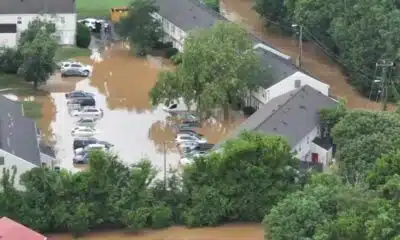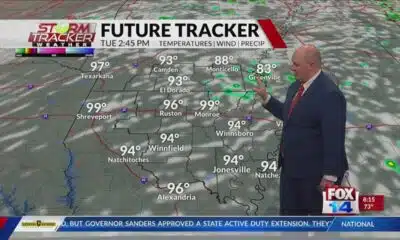News from the South - Alabama News Feed
Election officials blast Trump’s ‘retreat’ from protecting voting against foreign threats
Election officials blast Trump’s ‘retreat’ from protecting voting against foreign threats
by Matt Vasilogambros, Alabama Reflector
February 22, 2025
The Trump administration has begun dismantling the nation’s defenses against foreign interference in voting, a sweeping retreat that has alarmed state and local election officials.
The administration is shuttering the FBI’s Foreign Influence Task Force and last week cut more than 100 positions at the U.S. Cybersecurity and Infrastructure Security Agency. President Donald Trump signed the law creating the agency in 2018. Among its goals is helping state and local officials protect voting systems.
Secretaries of state and municipal clerks fear those moves could expose voter registration databases and other critical election systems to hacking — and put the lives of election officials at risk.
GET THE MORNING HEADLINES.
In Pennsylvania, Republican Secretary of the Commonwealth Al Schmidt said states need federal help to safeguard elections from foreign and domestic bad actors.
“It is foolish and inefficient to think that states should each pursue this on their own,” he told Stateline. “The adversaries that we might encounter in Pennsylvania are very likely the same ones they’ll encounter in Michigan and Georgia and Arizona.”
Officials from the Cybersecurity and Infrastructure Security Agency, known as CISA, and other federal agencies were notably absent from the National Association of Secretaries of State winter meeting in Washington, D.C., earlier this month. Those same federal partners have for the past seven years provided hacking testing of election systems, evaluated the physical security of election offices, and conducted exercises to prepare local officials for Election Day crises, among other services for states that wanted them.
But the Trump administration thinks those services have gone too far.
In a Feb. 5 memo, U.S. Attorney General Pam Bondi said the administration is dismantling the FBI’s task force “to free resources to address more pressing priorities, and end risks of further weaponization and abuses of prosecutorial discretion.” The task force was launched in 2017 by then-FBI Director Christopher Wray, a Trump nominee.
In her confirmation hearing last month, Homeland Security Secretary Kristi Noem said CISA has “gotten far off-mission.” She added, “They’re using their resources in ways that was never intended.” While the agency should protect the nation’s critical infrastructure, its work combating disinformation was a step too far, she said.
This echoes the language from the conservative Heritage Foundation’s Project 2025 document, which has driven much of the Trump administration’s policies. “The Left has weaponized [CISA] to censor speech and affect elections at the expense of securing the cyber domain and critical infrastructure,” it says.
But there is a direct correlation between pervasive election disinformation and political violence, election officials warn.
Federal officials led the investigations into the roughly 20 death threats that Colorado Democratic Secretary of State Jena Griswold has received over the past 18 months, Griswold said. Federal and Colorado officials also collaborated on social media disinformation and mass phishing scams.
“Trump is making it easier for foreign adversaries to attack our elections and our democracy,” Griswold said in an interview. “He incites all this violence, he has attacked our election system, and now he is using the federal government to weaken us.”
Colorado could turn to private vendors to, for example, probe systems to look for weaknesses, she said. But the state would be hard-pressed to duplicate the training, testing and intelligence of its federal partners.
Some election leaders aren’t worried, however.
“Kentucky has no scheduled elections in 2025, and we have no immediate concerns pending reorganization of this agency,” Republican Secretary of State Michael Adams told Stateline in an email.
Elections under attack
Since the Russian government interfered in the 2016 presidential campaign, the federal government has recognized that it overlooked security risks in the election system, said Derek Tisler, a counsel in the Elections and Government Program at the Brennan Center, a left-leaning pro-democracy institute.
Further, he said, the feds realized that election officials working in 10,000 local offices could not be frontline national security experts. On their own, local officials are incapable of addressing bigger security risks or spotting a coordinated attack across several states, Tisler said.
Much of the federal expertise and training came through CISA, Tisler said.
“Foreign interferers are not generally looking to interfere in Illinois’ elections or in Texas’ elections; they are looking to interfere in American elections,” he said. “A threat anywhere impacts all states. It’s important that information is not confined to state lines.”
During November’s presidential election, polling places in several states received bomb threats that were traced back to Russia. Ballot drop boxes in Oregon and Washington were lit on fire, and videos falsely depicting election workers destroying ballots circulated widely.
The fact that these attacks have not had a meaningful impact on the outcomes of elections may be due to the amount of preparation and training that came from federal assistance in recent years, said Maine Secretary of State Shenna Bellows, a Democrat.
Indeed, the right-leaning Foundation for Defense of Democracies praised the collaboration between federal and state and local partners on election security for dampening the impact of foreign interference in the presidential election, finding that adversaries did not “significantly” influence the results.
I am deeply concerned that what is happening is actually gutting the election security infrastructure that exists.
– Maine Democratic Secretary of State Shenna Bellows
When Bellows took office in 2021, federal national security officials led state officials in emergency response training. After Bellows completed the training, she insisted that her state’s clerks, local emergency responders and law enforcement officers participate as well.
In addition, Maine coordinated with the FBI to provide de-escalation training to local clerks, to teach them how to prevent situations, such as a disruption from a belligerent voter, from getting out of hand. In 2022, CISA officials traveled to towns and cities across the state to assess the physical security of polling places and clerks’ offices.
Bellows said she’s most grateful for the federal help she got last year when she received a deluge of death threats, members of her family were doxed, and her home was swatted.
“I am deeply concerned that what is happening is actually gutting the election security infrastructure that exists and a tremendous amount of knowledge and expertise in the name of this political fight,” she told Stateline.
In Ingham County, Michigan, Clerk Barb Byrum last year invited two federal officials to come to her courthouse office southeast of Lansing to assess its physical security. Byrum got county funding to make improvements, including adding security cameras and a ballistic film on the windows of her office.
“The federal support is going to be missed,” she said. “It seems as though the Trump administration is doing everything it can to encourage foreign interference in our elections. We must remain vigilant.”
Scott McDonell, clerk for Dane County, Wisconsin, used to talk to Department of Homeland Security officials frequently to identify cybersecurity threats, including vulnerabilities in certain software or alerts about other attacks throughout the country. Losing that support could incentivize more interference, he said.
“I think it’s a terrible idea,” he said. “How can you expect someone like me, here in Dane County, to be able to deal with something like that?”
States fill the gap
Local election officials are nervous and uncertain about the federal election security cuts, said Pamela Smith, president and CEO of Verified Voting, a nonprofit that works with state and local election officials to keep voting systems secure.
The threat landscape for elections is “extreme,” she said. And even though it’s not a major election year, quieter times are when election offices can prepare and perfect their practices, she said.
“It is a retreat and it’s a really ill-advised one,” she said. “It’s a little bit like saying the bank has a slow day on Tuesday, we’re going to let our security guards go home.”
With a federal exodus, there will be a real need for states to offer these sorts of programs and assistance, said Tammy Patrick, chief programs officer at the National Association of Election Officials, which trains and supports local officials.
“There’s going to be a big gap there for the states to try and fill,” she said. “Some of them might be sophisticated enough to be able to do some of it, but I think there’s going to be some real disparate application across the country of who’s going to be able to fill in those gaps.”
Bill Ekblad, Minnesota’s election security navigator, has leaned on the feds to learn the ropes of election security and potential threats, help him assist local election offices with better cyber practices and keep officials throughout the state updated with the latest phishing attempts.
He finds it disheartening to see the federal government stepping back, and worries that he won’t have access to intelligence about foreign threats. But after five years of working with the federal government, he is hopeful that his state has built resiliency.
“We have come a long way,” he said. “We will be able to move forward with or without the partnerships we’ve enjoyed in the past.”
Stateline is part of States Newsroom, a nonprofit news network supported by grants and a coalition of donors as a 501c(3) public charity. Stateline maintains editorial independence. Contact Editor Scott S. Greenberger for questions: info@stateline.org.
YOU MAKE OUR WORK POSSIBLE.
Alabama Reflector is part of States Newsroom, a nonprofit news network supported by grants and a coalition of donors as a 501c(3) public charity. Alabama Reflector maintains editorial independence. Contact Editor Brian Lyman for questions: info@alabamareflector.com.
The post Election officials blast Trump’s ‘retreat’ from protecting voting against foreign threats appeared first on alabamareflector.com
News from the South - Alabama News Feed
High heat & spotty shower chances grow over the week
SUMMARY: Over the next week, limited tropical development is possible in the Gulf of Mexico, with a 10% chance in two days and 30% over seven days, likely within 3-4 days. A low-pressure trough off the South Carolina and Georgia coasts will bring heavy rain to Florida within 24 hours, moving into the Gulf by Tuesday. This system may develop into a storm, causing heavy rain and moderate to high rip currents along the Gulf Coast through midweek. Rain chances will increase, especially Wednesday to Friday, with scattered showers and storms expected. High heat persists early in the week, reaching 94°F with heat indices around 102-104°F.
High heat & spotty shower chances grow over the week
Subscribe to WVTM on YouTube now for more: https://bit.ly/2jvAaUD
Get more Birmingham news: http://www.wvtm13.com
Like us: https://www.facebook.com/WVTM13/
Follow us: https://twitter.com/WVTM13
Instagram: https://www.instagram.com/wvtm13/
News from the South - Alabama News Feed
Pensacola Vintage Fest draws a new crowd for “old school cool”
SUMMARY: The Pensacola Vintage Fest attracted a large crowd eager for “old school cool” finds, with attendees lined up before opening. The event offered a curated collection of unique vintage items, especially band shirts and memorabilia, all under one roof. Organizers liken it to “Goodwill on steroids,” saving visitors hours of searching. Shoppers come to reconnect with the spirit of past decades, drawn to vintage fashion and music from eras like the ’80s. The one-day festival featured numerous vendors, vibrant displays, and local charm, making it a standout celebration of nostalgia and retro culture in Pensacola.
The one-day event brings in people from around the region.
News from the South - Alabama News Feed
Floods are swallowing their village. But for them and others, the EPA has cut the lifeline.
by Ames Alexander, Floodlight, Alabama Reflector
July 13, 2025
Acre by acre, the village of Kipnuk is falling into the river.
The small Alaskan tribal village sits on permafrost, which is thawing fast as global temperatures rise. That’s left the banks of the Kugkaktlik River unstable — and more likely to collapse when floods hit, as they often do. Buildings, boardwalks, wind turbines and other critical infrastructure are at risk, according to Rayna Paul, the village’s environmental director.
So when the village learned late last year that it had been awarded a $20 million federal grant to protect the riverbank, tribal members breathed a sigh of relief.
But that relief was short-lived. On May 2, the U.S. Environmental Protection Agency canceled the grant. Without that help, Paul says, residents may be forced to relocate their village.
“In the future, so much land will be in the river,” Paul says.
Kipnuk’s grant was one of more than 600 that the EPA has canceled since President Donald Trump took office, according to data obtained by Floodlight through a Freedom of Information Act request. Through May 15, the cuts totaled more than $2.7 billion.
Floodlight’s analysis of the data shows:
- Environmental justice grants took by far the biggest hit, with more than $2.4 billion in funding wiped out.
- The EPA has also canceled more than $120 million in grants aimed at reducing the carbon footprint of cement, concrete and other construction materials. Floodlight reported in April that the cement industry’s carbon emissions rival those of some major countries — and that efforts to decarbonize the industry have lost momentum under the Trump administration.
- Blue states bore the brunt. Those states lost nearly $1.6 billion in grant money — or about 57% of the funding cuts.
- The single largest grant canceled: A $95 million award to the Research Triangle Institute, a North Carolina-based scientific research organization that had planned to distribute the money to underserved communities. RTI also lost five other EPA grants, totaling more than $36 million.
More cuts could be coming. The Washington Post reported in late April on a court filing that showed the EPA had targeted 781 grants issued under Biden. The data obtained by Floodlight shows the majority of those grants have already been canceled.
Lawsuit challenges grant cancellations
Two weeks ago, a coalition of nonprofits, tribes and local governments sued the EPA, alleging the Trump administration broke the law by canceling environmental and climate justice grants that Congress had already funded.
“Terminating these grant programs caused widespread harm and disruption to on-the-ground projects that reduce pollution, increase community climate resilience and build community capacity to tackle environmental harms,” said Hana Vizcarra, a senior attorney at Earthjustice, one of the nonprofits that filed the lawsuit. “We won’t let this stand.”
The EPA declined to comment on the lawsuit. But in a written response to Floodlight, the agency said this about the grant cancellations:
“The Biden-Harris Administration shouldn’t have forced their radical agenda of wasteful DEI programs and ‘environmental justice’ preferencing on the EPA’s core mission. The Trump EPA will continue to work with states, tribes, and communities to support projects that advance the agency’s core mission of protecting human health and the environment.”
Congress created the Environmental and Climate Justice Block Grant program in 2022 when it enacted the Inflation Reduction Act (IRA), President Joe Biden’s landmark climate bill. The program was designed to help the disadvantaged communities that are often hit hardest by pollution and climate change.
But on Jan. 20, Trump’s first day back in office, he signed an executive order halting funding under the IRA, including money for environmental justice, and canceling a Biden-era executive order that prioritized tackling environmental racism. Separately, in his orders on diversity, equity and inclusion, Trump called for the closures of all environmental justice offices and positions in the federal government.
Underserved communities are often the most vulnerable to climate impacts such as heat waves and flooding because they have fewer resources to prepare or recover, according to a 2021 analysis by the EPA.
Inside the agency, not everyone agrees with the new direction. In a “declaration of dissent,” more than 200 current and former EPA employees spoke out against Trump administration policies, including the decision to dismantle the agency’s environmental justice program.
“Canceling environmental justice programs is not cutting waste; it is failing to serve the American people,” they wrote.
On Thursday, the EPA put 139 of the employees who signed the petition on administrative leave, Inside Climate News reported.
From hope to heartbreak in Texas
The people at Downwinders at Risk, a small Texas nonprofit that helps communities harmed by air pollution, thought they were finally getting a break.
Last year, they learned that the EPA had awarded them a $500,000 grant — enough to install nine new air quality monitors in working-class neighborhoods near asphalt shingle plants, a gas well and a fracking operation in the Dallas-Fort Worth area. The data would have helped residents avoid the worst air and plan their days around pollution spikes.
But on May 1, the group’s three employees received the news they’d been dreading: Their grant had been canceled.
“It was a very bitter pill to swallow,” said Caleb Roberts, the group’s executive director.
He and his team had devoted more than 100 hours to the application and compliance process.
The nonprofit’s annual budget is just over $250,000, and the federal funding would have allowed the group to expand its reach after years of scraping by. They’d even paused fundraising for six months, confident the federal money was on the way.
“We feel like we’re at ground zero again,” Roberts said. “And that’s just very unfortunate.”
Floodlight is a nonprofit newsroom that investigates the powers stalling climate action.
Alabama Reflector is part of States Newsroom, a nonprofit news network supported by grants and a coalition of donors as a 501c(3) public charity. Alabama Reflector maintains editorial independence. Contact Editor Brian Lyman for questions: info@alabamareflector.com.
The post Floods are swallowing their village. But for them and others, the EPA has cut the lifeline. appeared first on alabamareflector.com
Note: The following A.I. based commentary is not part of the original article, reproduced above, but is offered in the hopes that it will promote greater media literacy and critical thinking, by making any potential bias more visible to the reader –Staff Editor.
Political Bias Rating: Center-Left
This article primarily critiques the policies of the Trump administration for canceling EPA environmental and climate justice grants, highlighting the adverse effects on vulnerable communities and tribal villages. The focus on environmental justice, climate change impacts, and criticism of cuts to federal funding aligns with a Center-Left perspective that emphasizes government responsibility in addressing climate change and supporting underserved populations. The article presents factual data but frames the issue with a sympathetic tone toward those affected by the grant cancellations, reflecting a bias toward progressive environmental policies and opposition to conservative administrative actions.
-
News from the South - North Carolina News Feed6 days ago
Learning loss after Helene in Western NC school districts
-
News from the South - Tennessee News Feed1 day ago
Bread sold at Walmart, Kroger stores in TN, KY recalled over undeclared tree nut
-
News from the South - Missouri News Feed6 days ago
Turns out, Medicaid was for us
-
Local News7 days ago
“Gulfport Rising” vision introduced to Gulfport School District which includes plan for on-site Football Field!
-
News from the South - Florida News Feed6 days ago
The Bayeux Tapestry will be displayed in the UK for the first time in nearly 1,000 years
-
News from the South - Louisiana News Feed7 days ago
With brand new members, Louisiana board votes to oust local lead public defenders
-
Mississippi Today4 days ago
Hospitals see danger in Medicaid spending cuts
-
News from the South - Missouri News Feed6 days ago
Leawood changes street tree ordinance, launches sidewalk repair program











































